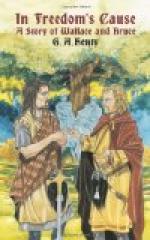Pembroke, the guardian, was to punish at his discretion all who harboured offenders. Those who abetted the slayers of Comyn, or who knowingly harboured them or their accomplices, were to be “drawn and hanged,” while all who surrendered were to be imprisoned during the king’s pleasure. The edict was carried out to the letter, and the English soldiery, with the aid of the Scotch of their party, scoured the whole country, putting to the sword all who were found in arms or under circumstances of suspicion.
Chapter XIV Colonsay
Archie, having little else to do, spent much of his time in fishing. As a boy he had learned to be fond of the sport in the stream of Glen Cairn; but the sea was new to him, and whenever the weather permitting he used to go out with the natives in their boats. The Irish coast was but a few miles away, but there was little traffic between Rathlin and the mainland. The coast there is wild and forbidding, and extremely dangerous in case of a northerly gale blowing up suddenly. The natives were a wild and savage race, and many of those who had fought to the last against the English refused to submit when their chiefs laid down their arms, and took refuge in the many caves and hiding places afforded in the wild and broken country on the north coast.
Thus no profitable trade was to be carried on with the Irish mainland. The people of Rathlin were themselves primitive in their ways. Their wants were few and easily satisfied. The wool of their flocks furnished them with clothing, and they raised sufficient grain in sheltered spots to supply them with meal, while an abundance of food could be always obtained from the sea. In fine weather they took more than sufficient for their needs, and dried the overplus to serve them when the winter winds kept their boats from putting out. Once or twice in the year their largest craft, laden with dried fish, would make across to Ayr, and there disposing of its cargo would bring back such articles as were needed, and more precious still, the news of what was passing in the world, of which the simple islanders knew so little. Even more than fishing, Archie loved when the wind blew wildly to go down to the shore and watch the great waves rolling in and dashing themselves into foam on the rocky coast. This to him was an entirely new pleasure, and he enjoyed it intensely. Perched on some projecting rock out of reach of the waves, he would sit for hours watching the grand scene, sometimes alone, sometimes with one or two of his comrades. The influx of a hundred visitors had somewhat straitened the islanders, and the fishermen were forced to put to sea in weather when they would not ordinarily have launched their boats, for in the winter they seldom ventured out unless the previous season had been unusually bad, and the stores of food laid by insufficient for winter consumption. Archie generally went out with an old man, who with two grownup sons owned a boat. They were bold and skilful fishermen, and often put to sea when no other boat cared to go out.




